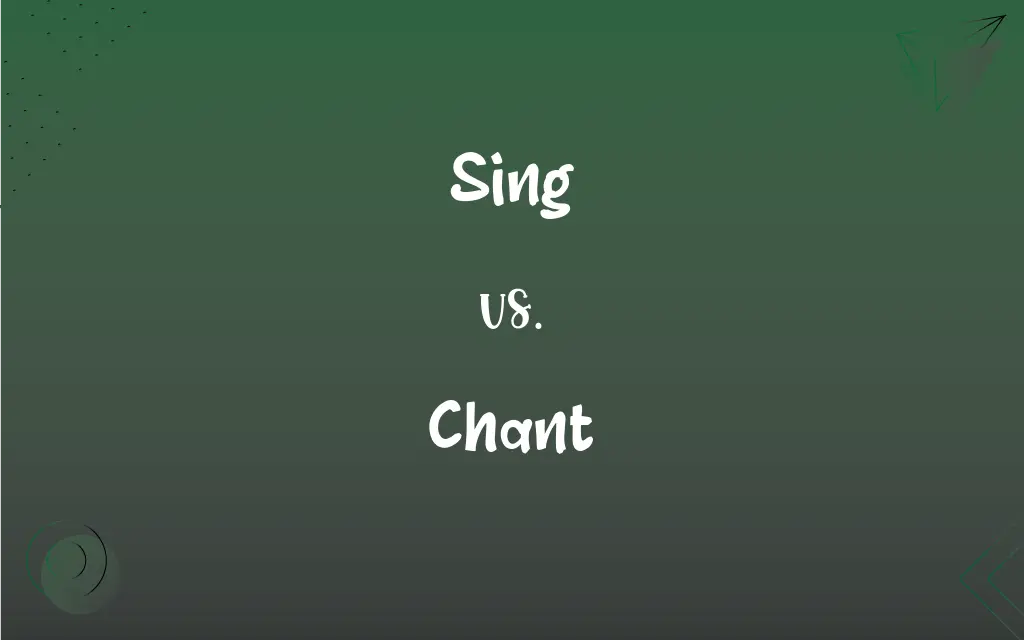Sing vs. Chant: What's the Difference?
By Harlon Moss & Aimie Carlson || Updated on May 20, 2024
Sing involves producing musical sounds with the voice, typically with melody and harmony, while chant refers to rhythmic speaking or singing, often in a repetitive and monotonous manner

Key Differences
Sing is the act of producing musical sounds with the voice, often involving melody, harmony, and varied pitch. It is commonly associated with songs and music, providing emotional expression and entertainment. Chant, on the other hand, involves rhythmic speaking or singing, characterized by repetition and a limited range of pitches, often used in religious or ritualistic contexts.
In singing, the voice follows a structured melody with variations in pitch and tone, aiming to create a musical composition. Chanting focuses more on the rhythm and repetition of phrases, usually maintaining a monotone or simple melodic line. Singing can involve complex arrangements and harmonies, whereas chanting tends to be simpler and more repetitive.
Singing is prevalent in various musical genres such as pop, classical, and jazz, providing diverse auditory experiences. Chanting is often found in religious ceremonies, meditation practices, and some cultural traditions, serving specific purposes like prayer or meditation.
While singing often requires a broader vocal range and control, chanting emphasizes consistency and rhythm over melodic variation. Both forms use the voice as an instrument but cater to different purposes and contexts, reflecting their unique characteristics and cultural significance.
Comparison Chart
Purpose
Musical expression, entertainment
Ritual, meditation, religious ceremonies
ADVERTISEMENT
Melody
Varied, with harmony and pitch changes
Monotone or simple melodic line
Complexity
Can be complex with arrangements and harmonies
Generally simple and repetitive
Vocal Range
Broad, requiring control and variation
Limited, focusing on rhythm and repetition
Context
Music genres like pop, classical, jazz
Religious and cultural traditions
Sing and Chant Definitions
Sing
(literary) To produce any type of melodious vocalisation.
ADVERTISEMENT
Chant
To recite or sing in a repetitive, rhythmic manner.
The monks chant their prayers every evening.
Sing
To confess under interrogation.
Chant
To perform a rhythmic, often ritualistic vocalization.
The priest chants the liturgy during the service.
Sing
To produce musical sounds with the voice.
She loves to sing in the choir every Sunday.
Chant
A psalm, etc., arranged for chanting.
Sing
To perform songs or melodies.
He will sing a solo at the concert tonight.
Chant
To maintain a steady rhythm and tone in vocal expression.
The fans chant together in unison at the game.
Sing
To express emotions or ideas through music.
The artist sings about love and loss.
Chant
A series of syllables or words that are sung on or intoned to the same note or a limited range of notes.
Sing
To utter a series of words or sounds in musical tones.
Chant
A canticle or prayer sung or intoned in this manner.
Sing
To vocalize songs or selections.
Chant
A monotonous rhythmic call or shout, as of a slogan
The chant of the crowd at the rally.
Sing
To perform songs or selections as a trained or professional singer.
Chant
To sing or intone to a chant
Chant a prayer.
Sing
To produce sounds when played
Made the violin sing.
Chant
To celebrate in song
Chanting a hero's deeds.
Sing
To make melodious sounds
Birds singing outside the window.
Chant
To say in the manner of a chant
Chanted defiant slogans.
Sing
To give or have the effect of melody; lilt.
Chant
To sing, especially in the manner of a chant
Chanted while a friend jumped rope.
Sing
To make a high whining, humming, or whistling sound.
Chant
To speak monotonously.
Sing
To be filled with a buzzing or ringing sound.
Chant
To sing, especially without instruments, and as applied to monophonic and pre-modern music.
Sing
To proclaim or extol something in verse.
Chant
To sing or intone sacred text.
Sing
To write poetry.
Chant
To utter or repeat in a strongly rhythmical manner, especially as a group.
The football fans chanted insults at the referee.
Sing
(Slang) To give information or evidence against someone.
Chant
To sell horses fraudulently, exaggerating their merits.
Sing
To produce the musical sound of
Sang a love song.
Chant
Type of singing done generally without instruments and harmony.
Sing
To utter with musical inflections
She sang the message.
Chant
(music) A short and simple melody, divided into two parts by double bars, to which unmetrical psalms, etc., are sung or recited. It is the most ancient form of choral music.
Sing
To bring to a specified state by singing
Sang the baby to sleep.
Chant
Twang; manner of speaking; a canting tone.
Sing
To intone or chant (parts of the Mass, for example).
Chant
A repetitive song, typically an incantation or part of a ritual.
Sing
To proclaim or extol, especially in verse
Sang his praises.
Chant
To utter with a melodious voice; to sing.
The cheerful birds . . . do chant sweet music.
Sing
A gathering of people for group singing.
Chant
To celebrate in song.
The poets chant in the theaters.
Sing
(intransitive) To produce musical or harmonious sounds with one’s voice.
"I really want to sing in the school choir," said Vera.
Chant
To sing or recite after the manner of a chant, or to a tune called a chant.
Sing
(intransitive) To perform a vocal part in a musical composition, regardless of technique.
Chant
To make melody with the voice; to sing.
Sing
(transitive) To express audibly by means of a harmonious vocalization.
Sing a lullaby
Chant
To sing, as in reciting a chant.
Sing
(transitive) To soothe with singing.
To sing somebody to sleep
Chant
Song; melody.
Sing
(ambitransitive) Of birds, to vocalise:
Chant
A short and simple melody, divided into two parts by double bars, to which unmetrical psalms, etc., are sung or recited. It is the most ancient form of choral music.
Sing
(ornithology) To produce a 'song', for the purposes of defending a breeding territory or to attract a mate.
Chant
Twang; manner of speaking; a canting tone.
His strange face, his strange chant.
Sing
(intransitive) To make a small, shrill sound.
The air sings in passing through a crevice.
A singing kettle
Chant
A repetitive song in which as many syllables as necessary are assigned to a single tone
Sing
To relate in verse; to celebrate in poetry.
Chant
Recite with musical intonation; recite as a chant or a psalm;
The rabbi chanted a prayer
Sing
(intransitive) To display fine qualities; to stand out as excellent.
The sauce really makes this lamb sing.
Chant
Utter monotonously and repetitively and rhythmically;
The students chanted the same slogan over and over again
Sing
(ergative) To be capable of being sung; to produce a certain effect by being sung.
Chant
To use a monotone or limited pitch range in vocalization.
The crowd began to chant the team's name.
Sing
(AU) In traditional Aboriginal culture, to direct a supernatural influence on (a person or thing), usually malign; to curse.
Chant
To speak or sing phrases repetitively.
Protesters chant slogans during demonstrations.
Sing
The act, or event, of singing songs.
I sometimes have a quick sing in the shower.
Sing
To utter sounds with musical inflections or melodious modulations of voice, as fancy may dictate, or according to the notes of a song or tune, or of a given part (as alto, tenor, etc.) in a chorus or concerted piece.
The noise of them that sing do I hear.
Sing
To utter sweet melodious sounds, as birds do.
On every bough the briddes heard I sing.
Singing birds, in silver cages hung.
Sing
To make a small, shrill sound; as, the air sings in passing through a crevice.
O'er his head the flying spearSang innocent, and spent its force in air.
Sing
To tell or relate something in numbers or verse; to celebrate something in poetry.
Bid her . . . singOf human hope by cross event destroyed.
Sing
To cry out; to complain.
They should sing if thet they were bent.
Sing
To utter with musical inflections or modulations of voice.
And they sing the song of Moses, the servant of God, and the song of the Lamb.
And in the darkness sing your carol of high praise.
Sing
To celebrate in song; to give praises to in verse; to relate or rehearse in numbers, verse, or poetry.
Arms and the man I sing.
The last, the happiest British king,Whom thou shalt paint or I shall sing.
Sing
To influence by singing; to lull by singing; as, to sing a child to sleep.
Sing
To accompany, or attend on, with singing.
I heard them singing home the bride.
Sing
Deliver by singing;
Sing Christmas carols
Sing
Produce tones with the voice;
She was singing while she was cooking
My brother sings very well
Sing
To make melodious sounds;
The nightingale was singing
Sing
Make a whining, ringing, or whistling sound;
The kettle was singing
The bullet sang past his ear
Sing
Divulge confidential information or secrets;
Be careful--his secretary talks
Sing
To create a pleasing sound with the voice.
The birds sing beautifully in the morning.
Sing
To use the voice melodically in a structured way.
Children often sing nursery rhymes.
FAQs
Can chanting be considered a form of singing?
Yes, chanting is a form of singing but it is more repetitive and monotone compared to melodic singing.
Where is chanting commonly used?
Chanting is often used in religious ceremonies, meditation practices, and cultural traditions.
Can chanting have a melody?
Chanting can have a simple melodic line but is typically more repetitive and monotone.
What is the main difference between sing and chant?
Singing involves melody and varied pitch, while chanting is rhythmic and repetitive with limited pitch variation.
Do singing and chanting require different vocal skills?
Yes, singing generally requires a broader vocal range and control, while chanting focuses on rhythm and consistency.
What is a common context for singing?
Singing is common in concerts, musical theater, and various music genres like pop and classical.
Is chanting easier than singing?
Chanting can be simpler due to its repetitive nature, but it still requires practice to maintain rhythm and consistency.
Can chanting be loud?
Yes, chanting can vary in volume depending on the context and purpose.
Are there specific genres associated with chanting?
Chanting is often associated with religious music, meditation chants, and some folk traditions.
Is singing always accompanied by music?
Not always; singing can be a cappella (without instrumental accompaniment).
Is there a specific posture for chanting?
Posture can vary, but often chanting is done in a seated or standing position with a relaxed body.
Are there famous chants?
Yes, chants like Gregorian chants and sports chants are well-known.
Can you chant a song?
Some songs can be chanted if they have a repetitive structure, but not all songs are suitable for chanting.
Does chanting require musical instruments?
No, chanting is typically vocal, though it can be accompanied by instruments.
Does chanting have health benefits?
Yes, chanting can have calming effects and is used in meditation and stress-relief practices.
Can one person chant alone?
Yes, chanting can be done individually as well as in groups.
Is chanting a universal practice?
Yes, many cultures around the world have their own forms of chanting.
Is singing or chanting more effective for group activities?
Both can be effective; singing for musical harmony and chanting for unison and rhythm.
Can chanting improve concentration?
Yes, the repetitive nature of chanting can aid in focus and concentration.
Can children chant?
Yes, children can easily learn to chant due to its repetitive nature.
About Author
Written by
Harlon MossHarlon is a seasoned quality moderator and accomplished content writer for Difference Wiki. An alumnus of the prestigious University of California, he earned his degree in Computer Science. Leveraging his academic background, Harlon brings a meticulous and informed perspective to his work, ensuring content accuracy and excellence.
Co-written by
Aimie CarlsonAimie Carlson, holding a master's degree in English literature, is a fervent English language enthusiast. She lends her writing talents to Difference Wiki, a prominent website that specializes in comparisons, offering readers insightful analyses that both captivate and inform.































































